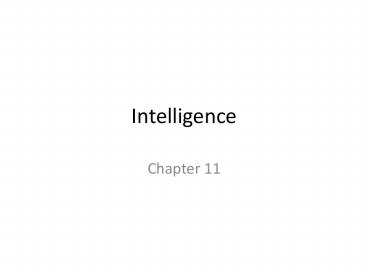Intelligence - PowerPoint PPT Presentation
1 / 15
Title:
Intelligence
Description:
Analytical-measured by traditional IQ tests. Creative intelligence. Practical intelligence ... Degree to which a test can be repeated with the same results ... – PowerPoint PPT presentation
Number of Views:1605
Avg rating:3.0/5.0
Title: Intelligence
1
Intelligence
- Chapter 11
2
What is intelligence?
- Socially constructed whatever society deems
intelligent - Two controversies regarding intelligence
- Is intelligence a single overall ability or
several specific abilities? - With the tools neuroscience now offers, can we
locate and measure intelligence within the brain?
3
Psychometric Approach (Factor Analysis)
- Study intelligence by emphasizing analysis of
products of intelligence, esp. IQ scores - Charles Spearman (1904, 1927
- Scores on all almost all tests of cognitive
ability were positively correlated - g and s
- g was a measure of mental force or intellectual
power - Correlations that could not be explained by g or
s are group factors
4
Psychometric Approach cont.
- L.L. Thurstone (1938)
- Opposed Spearmans theories
- Did not find one dominating g factor
- Found 7 independent primary mental abilities
- Numerical ability
- Reasoning
- Verbal fluency
- Spatial visualization
- Perceptual ability
- Memory
- Verbal comprehension
- Did not deny existence of g, but not as important
as primary mental abilities
5
Psychometric approach cont.
- Spearman argued that g tells us most of what we
need to know about a person's cognitive ability - Raymond Cattell (1963)
- Agreed with Spearman
- 2 kinds of g
- fluid basic power of reasoning and solving
problems - Crystallized specific knowledge gained as a
result of applying fluid intelligence
6
Information Processing Approach
- Analyzes the process involved in intelligent
behavior rather than test scores and other
products of intelligence - What mental operations are required to complete a
task? - Relates basic mental processes of perception,
learning, memory, and cognition to intelligence - Amount of attention paid
- Processing speed
7
Triarchic theory of intelligence
- Robert Sternberg (1988b, 1999)
- 3 types of intelligence
- Analytical-measured by traditional IQ tests
- Creative intelligence
- Practical intelligence
- Intelligence not just book smarts
- How do you measure this?
8
Multiple Intelligences
- Howard Gardner (1993)
- Focused on how people learn and use symbol
systems (language, math, music) - Does not require same abilities and processes
- 7 specific intelligences (1998)
- Use several sources to measure intelligences that
cannot be assessed by standard tests - Allows all people to be highly intelligent in
some area - Critics argue that some of the intelligences
tested have nothing to do with the concept of
intelligence
9
Emotional Intelligence
- Nancy Kantor and John Kihlstrom (1987)
- Social intelligence ability to comprehend social
situations and manage oneself successfully - Emotionally intelligent people are self-aware
- Can effectively manage their emotions and
impulses - MEIS developed to assess emotional intelligence
and its components - Ability to perceive emotions, understand emotions
and regulate emotions
10
Diversity in Cognitive Abilities
11
Creativity
- Ability to produce new high quality ideas or
products - How is this assessed? The Consequences Test
- Divergent thinking
- Components that make up creativity
- Expertise
- A set of creative skills
- Motivation to pursue creative production for
internal reasons - Adventuresome personality
- Creative environment
- Is creativity genetic?
12
Is Intelligence Neurologically Measureable?
- Correlation b/t brain size and intelligence
- Can this correlation be made? Why/Why not?
- Processing Speed
- Earl Hunt (1983)
- How fast you retrieve info from memory
- Perceptual speed
- Neurological speed
13
Assessing Intelligence
- Aptitude vs. achievement tests
- Wechsler Adult Intelligence Scale (WAIS)
- Includes 14 subtests
- 7 measure verbal skills 7 measure performance
skills
14
Test Construction
- Have two major advantages over interviews and
other means of evaluation - Standardization
- Summarized with a score
- Allow for the calculation of norms
- To determine the value of test, reliability and
validity most important
15
Test Construction cont.
- Reliability
- Degree to which a test can be repeated with the
same results - To determine reliability, compute correlation
coefficient - Validity
- Make sure the test predicts what it is supposed
to predict - Must have content validity
- Criterion-related validity (predictive validity)































